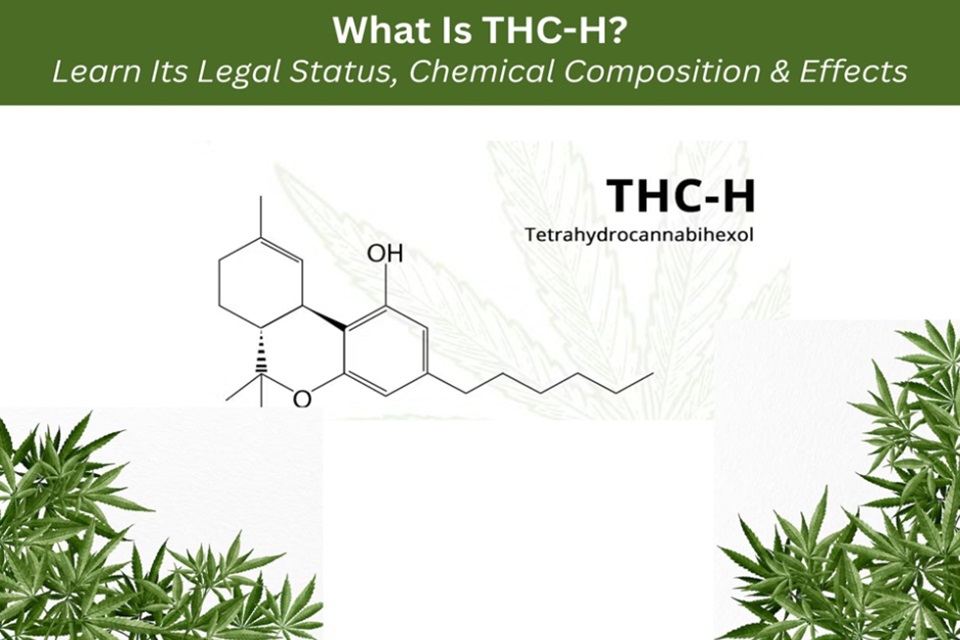
Tetrahydrocannabiphorol-Hexyl, abbreviated as THC-H, is a recently discovered cannabinoid. As scientists continue to search for new cannabinoids, THC-H stands out due to its unique and interesting properties. This article aims to explore THC-H, how it differs from other cannabinoids such as THC and CBD, its potential benefits, and its legal status. Come along with us as we examine THC-H and discover what sets it apart in the field of cannabis research.
What Is THC-H?
THC-H was found during research in Italy when researchers were isolating the THC-P from the marijuana strain. They found that the natural availability of THC-H, which is in the cannabis plant, is very limited. However, despite meager availability, it has high potency, more than its peer THC. One cannabis strain cannot fulfill the demand, so it is required to chemically convert it from CBD, just like Delta-8 and other hemp products.
Chemical Composition
THC-H is a cannabinoid with a longer n-hexyl side chain consisting of six carbons, unlike Delta-9 THC, which has a 5-carbon side chain. Due to its unique chemical structure, THC-H can bind more effectively to receptors in the brain than Delta-9 THC.
Is THC-H Legal?
The legal status of THC-H is not clear yet as it is in its initial phase of research. The certain thing is it is different from CBD in terms of creating a “high” effect. It is intoxicating and can have more potency than THC and THC-P. Considering this, THC-H would probably be treated as THC in legal matters. It is advised to check regional rules and regulations before carrying or consuming it.
Comparison With THC & CBD
| Feature | THC (Tetrahydrocannabinol) | CBD (Cannabidiol) | THC-H (Tetrahydrocannabiphorol-Hexyl) |
| Effect on Body | Gets you high; psychoactive. | Doesn’t get you high; calming. | Can be stronger than THC; psychoactive. |
| Legal Status | Often regulated due to psychoactivity. | Generally legal, with some restrictions. | Legal status varies; still being studied. |
| Benefits | Pain relief, relaxation. | Anxiety reduction, inflammation relief. | Similar to THC, but more potent. |
| Side Effects | Dizziness, paranoia. | Fatigue, changes in appetite. | Similar to THC, but potency varies. |
| Chemical Structure | Strongly binds to receptors. | Doesn’t bind as strongly to receptors. | Modified structure, potentially stronger. |
Benefits & Side Effects
Benefits:
- THC-H could help in treating mental health issues such as anxiety, depression, and panic attacks.
- It provides relief from muscle pain and inflammation in the body.
- It could provide comfort to insomniac who finds it unable to sleep peacefully.
- It can stimulate the appetite.
Side Effects:
- Beginners may get high with even small doses. Which may lead to nausea, dizziness, and loss of focus.
- High doses can result in inappropriate psychoactive activities.
- It may cause redness in the eyes, fatigue, and drowsiness.
- Dry mouth and headaches are the common side effects.
Final Summary
In conclusion, the Cannabis industry is thriving after the Farm Law 2018 legalized hemp and the products made from it with some terms and conditions. People are taking an interest in its therapeutic effects, which is why daily new cannabinoids are emerging, and THC-H is one of them found in 2020. Due to a lack of research, we are not certain about its benefits, side effects, and legal status, but its chemical composition indicates its higher potency than THC and THC-P. Users need to wait for the authentic results before opting for this cannabinoid.
FAQs
What is the chemical name of THC-H?
The chemical name of THC-H is Tetrahydrocannabiphorol-Hexyl.
How THC-H is different from THC, THC-P, and THC-JD?
THC-H is a newer cannabinoid that might be even stronger than regular THC. THC-P and THC-JD are lab-made versions of THC, with THC-P being studied for its potency.
What is the legal status of THC-H?
The legal status is uncertain as it’s a newer compound and is still being researched. Rules and regulations may vary depending on the region.





